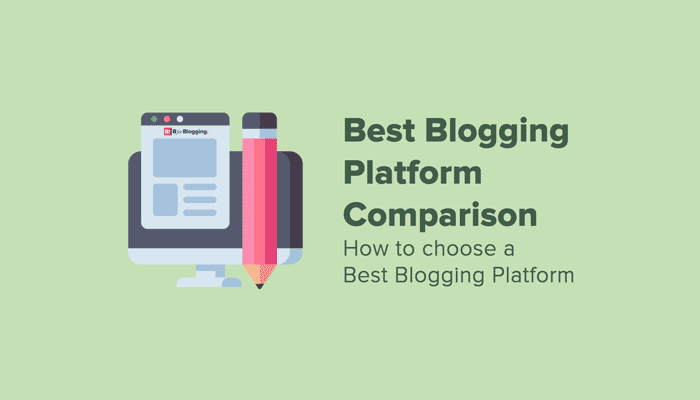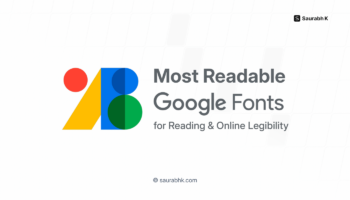So, you finally want to share your ideas and thoughts with the world. Or perhaps you have been posting articles and snippets on an unsecured blog site to see if blogging is a hobby you’d like.
You do know you can start blogging for free, but the question is – what are the best blogging platforms for your ideas.
We will love to give you a definite answer, but that depends on the content and the demographic too.
If you are sure that blogging is the chosen path for you, we can help you choose the best blogging platform for you.
It is overwhelming but read on…
In this article, we will list out the top blogging platforms in the world; give a brief description, pros, and cons too.
Why Choosing an Appropriate Blogging Platform is Important?
Bloggers and blogging are the classic narratives that the pen is mightier than the sword. Well, in this case, your keyboard.
While most people go into blogging for financial reasons, you know that is true. It is tricky to attain financial benefits on the wrong blogging platform.
Do you know you can earn as little as $20 to $50 per post as a newbie blogger?
If you punch your calculator for big-time bloggers, this will mean earnings of $100 to $1000 monthly.
Wow, just from writing alone? Yes, some bloggers make millions of dollars annually too, but not just from the writing.
And this can be you if you make the right choice and select a blogging platform that suite your niche and requirements.
In 1999, there were 23 blogs online. Today, we have over 512 million blogs on the internet. Before you start to think who read them, think again.
Still surprised, almost 6 million new blog posts are published daily with nearly 80 percent of internet users following or reading one blog post daily.
If you want to be part of the numbers making a change, there is a benchmark for top blogging platforms in the world.
The best blogging platform will expand on your idea and make blogging easy and fun.
What Makes the Best Blogging Platform?
There are a couple of blogging platforms on the internet, but each one has a reason why users love them. While some are user-friendly, others require a little more knowledge than just typing on your keyboard.
So when choosing a blogging platform, keep the following in mind –
- Easy to set up – this has to be first and foremost when choosing a blogging platform. We are not all IT specialists and do not know what all those HTML codes mean. Platforms like WordPress.org have taken the crown on this because it is easy for anyone to start a blog. Basically, if you can read the instructions and follow them, you will have your post in a matter of hours with a WordPress.org handle.
- Freedom to Customize – your blog, your style, at least that is what it should be. A good blogging platform should not restrict users on how to publish their pages.
- User community – the more, the merrier, this works in blogging too. The number of users shows you one thing; the platform has an extensive support system that users can trust.
It does not get better than that.
So, let’s find you the best blogging platform for you.
Are you ready?
1. WordPress.org
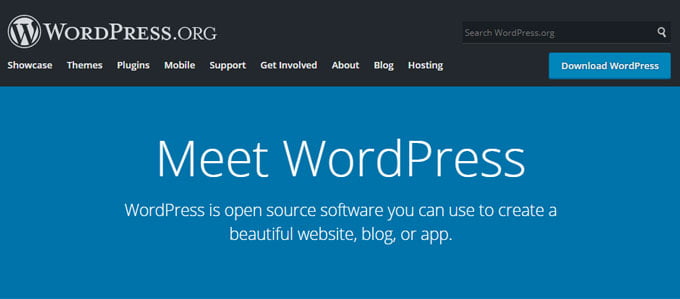
What Is WordPress? Explained for Beginners [1]
If you are looking for a blogging platform with a reliable reputation, community, support, and ever-growing population, you cannot beat WordPress.org.
Used by 35 percent of internet users, this platform founded in 2003 by Matt Mullenweg, and Mike Little is the most popular blogging community in the world with over 409 million views and 29 billion pages on its network.
WordPress takes the title as one of the best blogging platforms for several reasons; its ability to use technology to create an excellent balance on the site is unbelievable.
Furthermore, WordPress offers full control to the users with options on style, background, customization, and many more at your fingertips.
Even better is the flexibility, ease of use, and countless option to help you start your blogging career without stress.
For a blogging platform that received over 70 million posts and over 50 million comments posted, this is one to beat.
Pros of WordPress.org
- A great platform for blogging, e-commerce, and everyday project
- Easy to use website builder
- Ability to transition to other blog or website in the future
- Unlimited access to over 7,000 themes, design, and color for customization
- Excellent support for any type of blog
Cons of WordPress.org
- Site maintenance takes a long time
- Not the best for business bloggers
WordPress.org – Pricing
Like any other blogging platform, WordPress has a free for life plan. And it doesn’t limit yours to the numerous features on the site. However, if you are looking to have a professional-looking page, you need to buy a page builder like Divi from Elegant Themes.
In addition to that, as WordPress.org is a self-hosted blogging platform, you require to have good hosting like SiteGround that offers WordPress hosting plans from $6.99/month. If you do not wish to go with SiteGround, there is another reliable hosting you can consider is A2Hosting starts from $2.99 per month.
Anytime you can decide to start running your website at as low as $2.99/month.
Overall, WordPress.org is a sustainable blogging platform for any type of content. Whether you are blogging about food, health, career, pets, politics, or just want to pen down your thoughts – wordPress.org is it.
2. Blogger.com

First launched by Pyra Labs in 1999, Blogger is the first popular blogging platform that started blogging in the world. Currently owned by Google after it acquired it in 2003, the platform has received some upgrades and polishes.
If you love blogging but cannot deal with the technology and behind the scenes coding language involved, Blogger is an excellent blogging platform to get started on.
Although it is been pushed to the background by upcoming and tech-savvy platforms like WordPress.com. However, it has an amazing community of bloggers willing to lend a helping hand to you.
Despite its old fashion design and limited theme, color, and functionality, Blogger still remains the top blogging platform for beginner bloggers looking to get their voice into the world soonest.
Blogger might have been the platform that birthed the most popular bloggers in the world; it is limited in its functionality.
Bloggers allow you to post your content, add videos, images, and edit without any hassle.
Pros of Blogger.com
- The platform is very easy to set up and is a marvelous start-up for new bloggers looking for where to start
- Limited themes but beautiful graphics via multiple and flexible designs and layouts
- Free domain with registration
- Blends with other Google-based websites
- Make money with Google AdSense connected to your blog
- Compatible with Google Analytics gives you an insight of your audience boosting your performance
Cons of Blogger.com
- Control is limited
- The platform cannot be upgraded
- Does not have the modern amenities other platforms have
- Google is in control and can decide or change the rules of engagement
- Very difficult to transition to another blogging platform
Blogger.com – Pricing
It is totally free.
As regards to sustainability, it will still be here a couple of years down the line. However, to cater to a young tech-savvy community of bloggers, it needs some pressing upgrades and control passed over to the users.
3. Tumblr

Now we have a fun and witty blog that can easily pass for another social media network because of the setting and demography it caters to.
Tumblr is a very popular internet platform that doubles up as a micro-blogging and social network based in New York.
There is quite a difference between blogging and microblogging sites, however, blogging platforms usually refer to create long-form content and microblogging sites can be used for short length content or images.
The site was created by two web developers David Karp and Marco Arment in 2007. It was acquired by internet giant Yahoo! Inc in 2013 due to its popularity and ability to endear to a young crowd.
The site’s popularity and reputation garnered audiences across the world, with almost 500 million registered accounts and 400 million new visitors globally.
You might not know but the owner of this blogging platform has been changed and currently, Tumblr – the popular microblogging platform the platform is owned by Automatic (WordPress).
Tumblr allows you to enjoy blogging in a whole new level. Created for the younger audience, this platform allows you to add whatever you want from stories, content, music, current happenings, GIFs, and more.
The best part is you belong to a community of thinkers that love blogging as a hobby and fun thing to do in their off time.
If you are gunning to build a career as a serious blogger, Tumblr is not for you. Besides, the idea of reblogging your content is not the most appealing.
Pros of Tumblr
- Unlimited freedom of expression
- Enjoy free hosting and domain name with every registration
- Ability to share posts without restrictions
- Very easy to use
Cons of Tumblr
- Not the best blogging platform for a serious blogger
- You do not have right over your content
- Limited features
Tumblr Pricing
Tumblr is free. If you desire to use third-party themes and apps, you are liable to pay a fee.
Overall, the site is sustainable as the younger generation is the future of blogging. Tumblr is a great microblogging platform and offers a great way to start your blogging career in a fun and playful manner.
4. Joomla

Launched in 2005, Joomla is not your regular blogging platform. It is a more technically advanced content management system that enables users to do their own thing online using their software.
With Joomla, there is a catch, if you are a newbie blogger, this platform will appear too complicated and the learning curve too steep.
If you are already in content creation and need something unique that expresses your ideology and personality, Joomla will offer your that leverage to create unique content.
For those bloggers used to the finesse and versatility that WordPress offers but something higher, Joomla is exceptional.
The platform is free and flexible for any content you want. Joomla is a great blogging platform for e-commerce websites, business sites, and large blogs that manage upcoming bloggers.
Pros of Joomla
- It is very flexible, versatile and works to for all blog types and platforms
- Creative and professionally looking themes and background to give your website an attractive look
- High learning curve but easy to comprehend
Cons of Joomla
- Might be too challenging for new bloggers
- Your website issues are yours to handle
Pricing of Joomla
It is free. However, if you need a domain and hosting, you will be billed a token.
Overall, Joomla is a sustainable blogging platform. Its reliance on technology and software creation clearly distinguishes it from other platforms.
5. WordPress.com
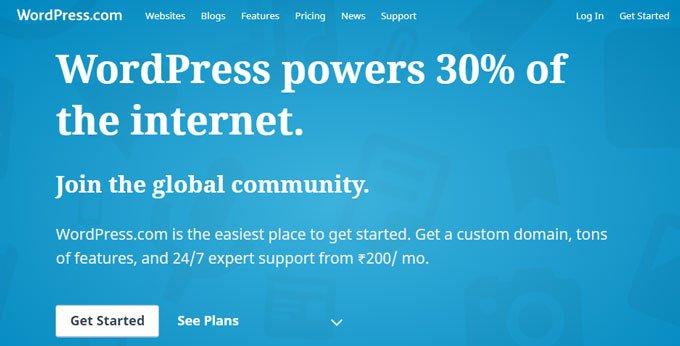
If you did not started your blogging career or content creation hobby without an account in WordPress.com, you missed out on the good old days.
WordPress was all about blogging and still is. Now, if you are reading this and wondering, WordPress has two blogging platforms?
Well, yes and no.
WordPress.com is the parent site founded by the same owners.
WordPress.org has evolved to meet the demand of consumers.
One this platform, you enjoy several features like automatic hosting, custom domain names, extra storage, and access to premium themes and plugins with paid plans.
Pros of WordPress.com
- Simple, versatile, powerful platform without all the tech language
- No need for setup, registration does it all
- Manage and publish content without any hassle
- Quickly install a theme that is easy to blend into your ideas
- Compatible on most devices
Cons of WordPress.com
- You cannot have a domain name without the dot WordPress dot com
- Customization is not easy
- Transition to other sites is hard
- Control belongs to wordpress.com
- You are liable to be kicked off the platform if you infringe on the rules of the platform
Pricing of WordPress.com
It is absolutely free, but you have to deal with ads and content by the site popping up on your page.
However, at $8 per month, you have access to tools and themes to help you build a powerful start to your blogging career.
Until WordPress.org, it was sustainable for bloggers and newbie bloggers to be. When compared with the current blogging platforms, it is still okay, but it can be better if it gives control to the users.
6. Wix
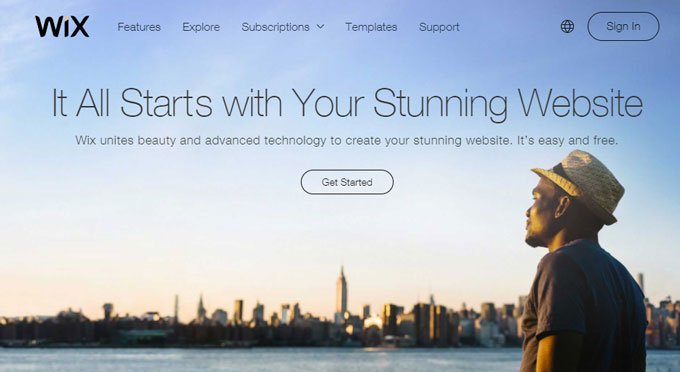
If you are on the lookout for a blogging platform that allows you to go all out in creativity and uniqueness, this is it.
The Wix platform is absolutely beautiful and delivers amazing finishes to your website, blogs, and e-commerce site.
As a website builder, users get access to countless options to grow and groom their creation to life over a lasting period.
The cloud-based software interface was founded in 2006 by an Israeli company and compatible with any device, including mobile phones.
If you are wondering how popular is the platform?
Currently, Wix is available in almost 200 countries across the globe, with over 100 million users creating unique websites for everything.
If you can think of an idea, Wix will help you bring it to life.
Wix is used mostly for businesses, but it is super versatile and great for starting a blog too. With Wix, your ideas and business come to life with a click.
Pros of Wix
- Extremely easy interface with ample storage
- Excellent support structure for beginners
Cons of Wix
- Wix ads and branding is an unwanted distraction
- SEO capability is lagging
- If you choose the wrong theme, you can’t edit or make change
Wix Pricing
While you have free access to use some of the platform’s functions, prices range from $4.50 per month to $24.50 per month. You have to make your choice.
For small businesses and bloggers, Wix is the perfect startup blogging platform to build your persona.
It is highly sustainable and a great way to get busy creating your hobby without stress.
7. Drupal

Drupal is an open-source content management system for content creators, developers, and businesses.
Although it is a great platform for website design and application, Drupal suits advanced tech-savvy bloggers than beginners.
Beginners might find the Drupal platform complicated despite its flexibility, versatility, reliability, and performance.
Drupal was founded by Dries Buytaert; it has a community of dedicated users. With over 1.4 million downloads and 1.2 million websites across the globe using Drupal, it is very popular.
For content creators, Drupal is outstanding.
Its features are up-to-date, the application is easy to use despite the learning curve, and versatility allows for numerous types of content to be created and published through the platform.
However, for simple everyday bloggers, Drupal can be quite a learning curve and a swift dynamic experience most people are not ready to contend with.
Pros of Drupal
- Astounding security and support from the Drupal team
- The best platform for digitally enhanced content
- Access to unlimited add-ons to customize your creation
- Robust, scalable, versatile, and unique
Cons of Drupal
- Not beginner-friendly
- Too technical and requires some tech know-how
Pricing of Drupal
Drupal is an open-source platform and completely free.
Overall, the site is excellent for all things digital, including blogging. Perhaps its functionality gravitates towards other projects outside blogging, but it is a sustainable site delivering excellent results.
8. Medium
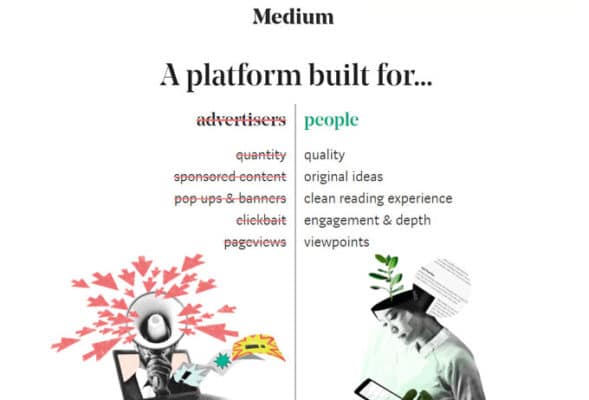
Medium is a full-fledged blogging platform for high-quality content of all kinds. Whether it is food, adventure, politics, governance, technology, trade, if you want a place to be heard, it is Medium.
Founded by Evan Williams and launched in 2012, this simple platform has grown to be one of the most visited in the world. Reaching a staggering 120 million readers across the globe, it is just amazing.
Some of the best features on Medium are the no ads or pop-ups and the amazing access to intellectual insight from a wide array of mindset in different levels of understanding.
Who can use this easy to access platform?
I would say, everyone, if you have a flair for writing great content, share your thoughts on Medium.
Pros of Medium
- Easy to set up and an incredibly user-friendly platform
- Great for new bloggers looking for a stable and robust platform to start their career
- You do not need any technical know-how
- Access to a growing community of reader who can access your work
Cons of Medium
- If you are looking to make money off writing, not on this platform
- Customization is limited
Pricing of Medium
Medium is free. All you need is to sign up and start writing.
The medium might be new to the world, but it has the vision to get the best content for the world. Its ability to accommodate any type of write up makes them sustainable and welcoming to bloggers.
9. Weebly

If you don’t have time for HTLM/CSS coding terms and want to get on with promoting your business on a good platform, you might want to sign up with Weebly now.
Other than the 250 million new visitors that frequent the platform, they are used by over 30 million website owners in the world.
Their powerful, robust, and secure platform made them popular. For bloggers, Weebly’s ability to build, design, and launch your blog, online store, or business without any technical hindrance was the golden buzzer.
Weebly is a drag-to-drop web interface that proves that every user can design their website without all the troubles that come along with it.
So if you are a blogger, you will enjoy loads of themes, features, add-ons that will have your publishing your post daily.
Pros of Weebly
- Supports Google Analytics
- Powerful SEO features to get you set up online
- Simple to set up and use
- Compatible with mobile devices
Cons of Weebly
- Transition to other site is not easy
- Ads and branding with the free plan
- Limited storage
Pricing of Weebly
At $4 per month, you get a free custom domain, but at $8 -$25, you get more features and no Weebly ads or branding.
For now, the Weebly platform is still growing, which is good. It shows improvement, especially as the competition stiffened among blogging platforms. However, they are sustainable, and for bloggers, it is a great place to start.
10. Ghost
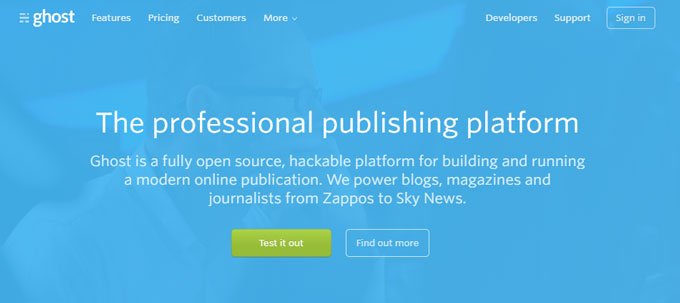
Every blogging platform has a story, but Ghost tells a story.
The page is clean, intuitive, and easy to navigate and ready to go. Whether you are a blogger, developer, or entrepreneur, Ghost got your back.
This open-source platform was founded for content creators.
One feature that attracts Ghost to bloggers is the ability to preview your blog post before publishing the content for the public.
Furthermore, it is a very easy software application to download and host all on your own without external assistance.
As one of the top blogging platforms on the internet, Ghost is an excellent place for beginners and professional bloggers to publish their work.
The easy to use interface and access to blogging tools enable you to create, edit, organize, and publish your work effectively.
Pros of Ghost
- Seamless integration with most content platforms
- You need BlueHost to host your blog site
- Superfast software based on JavaScript coding
- Excellent SEO capabilities
- The free version requires no need for a setup
- Created for bloggers and blogging
Cons of Ghost
- Themes, configuration, and designs are limited
- Self-hosting is not easy
Pricing of Ghost
The Ghost self-host version is free, but it offers paid options too. There are three paid plans:
- The basic plan at $29 per month or $19 per annum with SSL and 50k per month page view
- The standard plant at $79 per month with 500,000 per month page views and support
- The business plan with 1 million views and 99.9 percent uptime at $199 per month
11. Squarespace
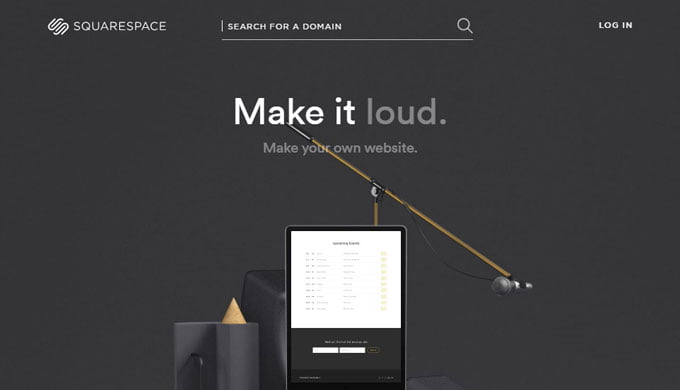
This blogging platform caters to small businesses looking to create a unique but professional website for their online store.
Founded in 2004, it is an all-inclusive platform that enables you to create, host, and publish your content on the web.
But that is not all. Using this blogging platform accords you immerse support, domain, and access to Google Analytics for better SEO presence online.
Squarespace stands out to business owners and content creators because of its ability to accept and integrate intense image files on its site and on your blog without causing any lag.
Also, content published on Squarespace is shareable outside the platform.
Squarespace understands the need for compatibility, their software is mobile optimized and fully customizable.
The platform is popular among artists, business content creators, small e-commerce, and bloggers. It helps them to capture the audience with images that tell more stories than their write-ups.
Pros of Squarespace
- 24/7 support via email, phone or online
- Very easy to create a website with a free domain name
- Powerful SEO tool to reach and grow your audience
- Everything you need to develop your brand in one place
- Numerous resources to help you master the tricks of blogging
Cons of Squarespace
- Limited templates
- No auto-save feature
Squarespace Pricing
While you enjoy the free trial, it has four plans
- Personal plan at $ 12 per month
- The business plan at $18 per month
- The basic commerce and advance commerce at $26 and $40 per month
Although Squarespace is a great blogging platform, it might not be the ideal one for your style of blogging. It is sustainable and incredible for lifestyle, fashion, and e-commerce. It does allow you to create a beautiful website but is restrictive for some.
Final Thoughts
Bloggers and blogging platforms are doing a thorough and remarkable job of creating content that balances our busy lives.
With the number of smartphone users shooting through the roof, blogging speaks to every age group, gender, sexuality, opinion, deeper than anything the world has seen before.
Despite the number of best blogging platforms on the internet, WordPress.org is the best blogging platform for a million reasons.
Asides from been self-hosting, it is a great platform for any type of blogger. If you have an idea, you can bring it to light with/on WordPress.org.
Its simplicity, intuitive setting, versatility, and colorful platform make it the best blogging platform for newcomers and professional bloggers.
It might not be totally free, but it gives your blogging career a good starting foundation.
However, if you are planning to blog occasionally and you would not mind paying a nominal monthly fee, then you can consider WordPress.com, Wix, and Squarespace as your go-to the blogging platform.
On the other hand, if you want to explore the best free blogging platforms, you should start your blogging with Medium.
Which blogging platform did you find the best? Have you started using any one of them? Share your views/questions in the comments section below. We would be happy to hear from you.
Cheers!!!
More to read –
